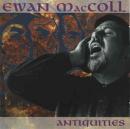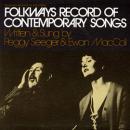In the morning we built the city
In the afternoon walked through its streets
Evening saw us leaving
We wandered through our days as if they would never end
All of us imagined we had endless time to spend
We hardly saw the crossroads
And small attention gave
To landmarks on the journey from the cradle to the grave,
cradle to the grave, cradle to the grave
Did you learn to dream in the morning?
Abandon dreams in the afternoon?
Wait without hope in the evening?
Did you stand there in the traces and let them feed you lies?
Did you trail along behind them wearing blinkers on your eyes?
Did you kiss the foot that kicked you?
Did you thank them for their scorn?
Did you ask for their forgiveness for the act of being born,
act of being born, act of being born?
Did you alter the face of the city?
Did you make any change in the world you found?
Or did you observe all the warnings?
Did you read the trespass notices, did you keep off the grass?
Did you shuffle off the pavement just to let your betters pass?
Did you learn to keep your mouth shut,
Were you seen and never heard?
Did you learn to be obedient and jump to at a word,
jump to at a word, jump to at a word?
Did you ever demand any answers?
The who, the what or the reason why?
Did you ever question the setup?
Did you stand aside and let them choose while you took second best?
Did you let them skim the cream off and then give to you the rest?
Did you settle for the shoddy?
Did you think it right
To let them rob you right and left and never make a fight,
never make a fight, never make a fight?
What did you learn in the morning?
How much did you know in the afternoon?
Were you content in the evening?
Did they teach you how to question when you were at the school?
Did the factory help you grow, were you the maker or the tool?
Did the place where you were living
Enrich your life and then
Did you reach some understanding of all your fellow men,
all your fellow men, all your fellow men?
In the afternoon walked through its streets
Evening saw us leaving
We wandered through our days as if they would never end
All of us imagined we had endless time to spend
We hardly saw the crossroads
And small attention gave
To landmarks on the journey from the cradle to the grave,
cradle to the grave, cradle to the grave
Did you learn to dream in the morning?
Abandon dreams in the afternoon?
Wait without hope in the evening?
Did you stand there in the traces and let them feed you lies?
Did you trail along behind them wearing blinkers on your eyes?
Did you kiss the foot that kicked you?
Did you thank them for their scorn?
Did you ask for their forgiveness for the act of being born,
act of being born, act of being born?
Did you alter the face of the city?
Did you make any change in the world you found?
Or did you observe all the warnings?
Did you read the trespass notices, did you keep off the grass?
Did you shuffle off the pavement just to let your betters pass?
Did you learn to keep your mouth shut,
Were you seen and never heard?
Did you learn to be obedient and jump to at a word,
jump to at a word, jump to at a word?
Did you ever demand any answers?
The who, the what or the reason why?
Did you ever question the setup?
Did you stand aside and let them choose while you took second best?
Did you let them skim the cream off and then give to you the rest?
Did you settle for the shoddy?
Did you think it right
To let them rob you right and left and never make a fight,
never make a fight, never make a fight?
What did you learn in the morning?
How much did you know in the afternoon?
Were you content in the evening?
Did they teach you how to question when you were at the school?
Did the factory help you grow, were you the maker or the tool?
Did the place where you were living
Enrich your life and then
Did you reach some understanding of all your fellow men,
all your fellow men, all your fellow men?
inviata da Bernart - 26/7/2013 - 10:13
Lingua: Italiano
Tentativo di traduzione italiana di Bernart (dateci un’occhiata, please!)
BALLATA DELLA CONSAPEVOLEZZA
Al mattino costruimmo la città,
Nel pomeriggio camminavamo per le sue strade
La sera ci vide andarcene
Attraversammo i nostri giorni come se non dovessero finire mai
Noi tutti immaginavamo di avere un tempo infinito da trascorrere.
Quasi non facevamo caso agli incroci
Poca attenzione avevamo per i momenti importanti che segnavano il nostro cammino dalla culla alla bara,
dalla culla alla tomba, dalla culla fino alla tomba
Hai imparato a sognare al mattino?
Hai abbandonato sogni al pomeriggio?
Hai atteso senza speranza alla sera?
Hai ripercorso tracce già segnate e ti sei lasciato nutrire dalle loro bugie?
Hai seguito quelle tracce mettendoti i paraocchi?
Hai baciato il piede che ti ha preso a calci?
Li hai ringraziati per il loro disprezzo?
Hai chiesto loro perdono per il solo fatto di essere nato,
Per il fatto di essere nato, per essere nato?
Hai contribuito a cambiare l’aspetto della città?
Hai determinato dei cambiamenti nel mondo così come lo hai trovato?
Oppure hai rispettato ogni avvertimento?
Hai osservato i divieti, non ha calpestato le aiuole?
Ti sei prostrato al passaggio di quelli migliori di te?
Hai imparato a tenere la bocca chiusa?
Hai imparato ad obbedire ed a scattare ad ogni ordine
a scattare all’ordine, a scattare all’ordine?
Hai mai preteso delle risposte?
Chi, che cosa e perché?
Hai mai messo in discussione il sistema?
Stavi accanto a loro e li ha lasciati fare mentre tu ti rassegnavi a scegliere per secondo?
Li ha lasciati prendere ciò che volevano accontentandoti degli avanzi?
Ti sei accontentato delle cose più scadenti?
Pensi che sia giusto
Lasciare che ti freghino continuamente senza che tu ti ribelli,
senza mai ribellarti, senza mai lottare?
Che cosa hai imparato al mattino?
Quante cose hai conosciuto al pomeriggio?
Alla sera eri appagato?
Ti hanno insegnato come fare le domande quando eri a scuola?
La fabbrica ti ha aiutato a crescere, eri l’artefice o lo strumento?
Quello che hai fatto ha arricchito la tua vita e poi
Hai imparato qualcosa dai tutti i tuoi compagni
da tutti i tuoi compagni, i tuoi compagni?
Al mattino costruimmo la città,
Nel pomeriggio camminavamo per le sue strade
La sera ci vide andarcene
Attraversammo i nostri giorni come se non dovessero finire mai
Noi tutti immaginavamo di avere un tempo infinito da trascorrere.
Quasi non facevamo caso agli incroci
Poca attenzione avevamo per i momenti importanti che segnavano il nostro cammino dalla culla alla bara,
dalla culla alla tomba, dalla culla fino alla tomba
Hai imparato a sognare al mattino?
Hai abbandonato sogni al pomeriggio?
Hai atteso senza speranza alla sera?
Hai ripercorso tracce già segnate e ti sei lasciato nutrire dalle loro bugie?
Hai seguito quelle tracce mettendoti i paraocchi?
Hai baciato il piede che ti ha preso a calci?
Li hai ringraziati per il loro disprezzo?
Hai chiesto loro perdono per il solo fatto di essere nato,
Per il fatto di essere nato, per essere nato?
Hai contribuito a cambiare l’aspetto della città?
Hai determinato dei cambiamenti nel mondo così come lo hai trovato?
Oppure hai rispettato ogni avvertimento?
Hai osservato i divieti, non ha calpestato le aiuole?
Ti sei prostrato al passaggio di quelli migliori di te?
Hai imparato a tenere la bocca chiusa?
Hai imparato ad obbedire ed a scattare ad ogni ordine
a scattare all’ordine, a scattare all’ordine?
Hai mai preteso delle risposte?
Chi, che cosa e perché?
Hai mai messo in discussione il sistema?
Stavi accanto a loro e li ha lasciati fare mentre tu ti rassegnavi a scegliere per secondo?
Li ha lasciati prendere ciò che volevano accontentandoti degli avanzi?
Ti sei accontentato delle cose più scadenti?
Pensi che sia giusto
Lasciare che ti freghino continuamente senza che tu ti ribelli,
senza mai ribellarti, senza mai lottare?
Che cosa hai imparato al mattino?
Quante cose hai conosciuto al pomeriggio?
Alla sera eri appagato?
Ti hanno insegnato come fare le domande quando eri a scuola?
La fabbrica ti ha aiutato a crescere, eri l’artefice o lo strumento?
Quello che hai fatto ha arricchito la tua vita e poi
Hai imparato qualcosa dai tutti i tuoi compagni
da tutti i tuoi compagni, i tuoi compagni?
inviata da Bernart - 26/7/2013 - 10:16
Secondo me hai fatto una traduzione all'altezza, Bernart; quel che mi dà da pensare è proprio il titolo, l' "accounting" in particolare. Ci devo pensare su.
Riccardo Venturi - 26/7/2013 - 12:18
Al bilancio generale avevo pensato anch'io, ti giuro...in realtà "accounting" vuol dire proprio "contabilità". Come se fosse una "Ballata del fare i conti..."
Riccardo Venturi - 26/7/2013 - 14:06
Ciao a tutti, e innanzitutto grazie per questa pagina!
Col mio gruppo abbiamo fatto una versione di questo brano e spesso anche io mi sono chiesto cosa volesse dire esattamente "accounting" e propenderei per l'ultima osservazione qui sopra: secondo me si tratta di "fare i conti" in senso figurato.
Quindi si potrebbe dire "La ballata della resa dei conti"
Col mio gruppo abbiamo fatto una versione di questo brano e spesso anche io mi sono chiesto cosa volesse dire esattamente "accounting" e propenderei per l'ultima osservazione qui sopra: secondo me si tratta di "fare i conti" in senso figurato.
Quindi si potrebbe dire "La ballata della resa dei conti"
Luca - 8/1/2019 - 23:55
Ciao Luca,
mi pare un'ottima traduzione.
Se puoi, metti a disposizione del sito una registrazione audio o video della vostra versione.
Grazie!
Saluti
mi pare un'ottima traduzione.
Se puoi, metti a disposizione del sito una registrazione audio o video della vostra versione.
Grazie!
Saluti
Bernart Bartleby - 9/1/2019 - 20:28
×
![]()








Parole e musica di Ewan MacColl
Credo che il primo disco in cui l’ha incisa sia “Angry Muse” del 1968, ovviamente con con Peggy Seeger, ma la canzone fu scritta per “Landmarks”, programma radiofonico della BBC.
Interpretata anche da Karan Casey
“…Composed in 1964, the song catches the fifty year-old MacColl in retrospective mood, revisiting the music of Bertolt Brecht and Hans Eisler. The youthful MacColl had first absorbed these stirringly exotic sounds during his leadership of the Red Megaphones, a Salford-based agit-prop street theatre troupe that palely imitated their more famous namesake, Das Rote Sprachror of Berlin. Ballad of Accounting suits busking precisely because it expresses the ambivalence and frustrations felt by many street performers. The song communicates the agitated excitement of closing the gap between culture and everyday life, of talking directly to the audience, of making an unmediated impact. At the same time, the song’s urgent tones communicate an anxiety that no-one is actually listening. Recalling his street performing days, MacColl above all remembered the ‘blank apathy … harder to take than abuse.’ Stridently provocative, Ballad of Accounting buttonholes and interrogates the silent majority passing by. Like much of MacColl’s work, it is generated by a desire to convert quiet acquiescence into a questioning and engaged political outlook..” (Ben Harker, da “The Cultural and Political Life of Ewan MacColl”)
Composta nel 1964, la canzone coglie il cinquantenne MacColl in un’attitudine retrospettiva, guardando alla musica di Bertolt Brecht and Hanns Eisler. Il giovane MacColl aveva all’inizio assorbito con entusiasmo quelle sonorità insolite all’epoca dei “Red Megaphones”, una compagnia teatrale ‘agit-prop’ di strada che pretendeva rifarsi alla famosa “Das Rote Sprachrohr” berlinese. La “Ballata della consapevolezza” è proprio una canzone di strada ed esprime i sentimenti contrastanti e le frustrazioni provate da molti artisti di strada. La canzone comunica l’urgenza di colmare la distanza tra cultura e vita di tutti i giorni, di parlare chiaramente agli spettatori, di avere un impatto immediato. Al tempo stesso, i suoi toni insistenti trasmettono la preoccupazione che nessuno in realtà stia ascoltando. Riferendosi all’epoca in cui si esibiva per strada MacColl prima di tutto ricordava “la totale apatia… più duro che ricevere un insulto”. Acutamente provocatoria, la “Ballata della consapevolezza” insegue ed incalza la maggioranza silenziosa che passa e va. Come molta parte del lavoro di MacColl, è generata dal desiderio di trasformare la bieca accettazione in un atteggiamento curioso, ansioso di risposte, politicamente impegnato.